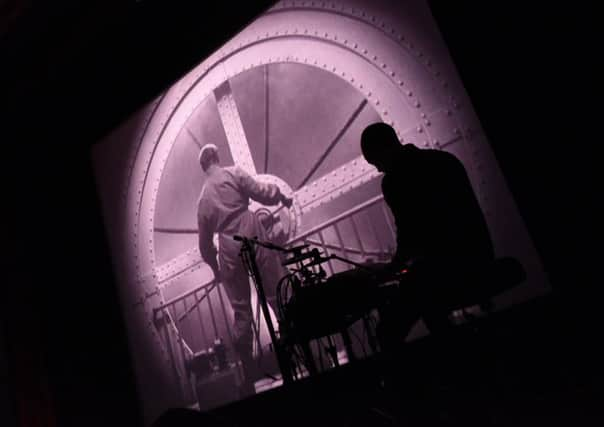Hippfest: How music is breathing new life to silent films


A ground-breaking vintage space movie with a live electronic score, the first ever film adaptation of Peter Pan, accompanied by a specialist in fairy harp music ... It can only be Bo’ness’s Hippodrome Festival of Silent Cinema, which opens on Wednesday.
Scotland’s only silent film festival, the sixth “Hippfest”, as it’s popularly known, returns to the Hippodrome cinema, not only Scotland’s first purpose-built picture house but an A-listed example of pre-Art Deco cinema architecture. This year’s highlights include an extraordinary German sci-fi drama-documentary from 1925, Wunder der Schöpfung, exploring, as its title suggests, “the wonders of creation”, with the help of remarkable early cinematic special effects and a score by the electronic duo Herschel 36.
Advertisement
Hide AdAdvertisement
Hide AdWednesday’s opening night features a restored classic of Soviet cinema, Earth, directed in 1930 by Alexander Dovzhenko. Here given a newly commissioned score by festival veterans Jane Gardner and Hazel Morrison, Earth is a beautifully filmed and slyly subversive portrayal of Ukrainian peasant life. In complete contrast is the first screen adaptation of Peter Pan, from 1924, sanctioned by the tale’s creator, J M Barrie, who personally chose its star, a 17-year-old unknown called Betty Bronson, over Gloria Swanson and Mary Pickford. Accompanying it is the highly regarded silent film harpist – and “fairy harp music specialist” – Elizabeth-Jane Baldry.
Other offerings include Mania: Story of a Cigarette Factory Worker, a rarity dating from 1918. It stars the Polish-born screen siren Pola Negri and the live score sees the UK debut of the Polish band Czerwie, whose blend of electronica and ethno-pop has already accompanied such silent classics as Nosferatu. Another highlight is the Chinese film Daybreak, from 1933, starring “the Chinese Mae West”, Li Lili, and with music from silent score specialist John Sweeney (who with percussionist Frank Bockius will also lend his keyboard skills to a Laurel and Hardy triple bill).
The real surprise, however, is the astonishing Wunder der Schöpfung, in which intrepid space explorers fly their craft through the cosmos as no less than 15 equally intrepid pioneer special effects boffins create what must be the first screen evocation of weightlessness and other heavenly wonders. The live score will be provided by pianist and electronic keyboardist Paul Harrison and percussionist Stu Brown, both well-known figures on the Scottish jazz scene, who play together under the title of Herschel 36, named after a blue star at the heart of the Lagoon Nebula. There is additional piquancy in the fact that Brown’s father is Professor John C Brown, Astronomer Royal for Scotland, who will introduce the Bo’ness screening and has written the programme notes.
“It’s entirely coincidental that a group with this name has ended up doing this, but it’s perfect,” says Harrison. Scoring for the film presented new challenges for the duo, whose performances are normally totally improvised, he agrees, “We get certain sounds and vibes, and doing the film gives us focus on knocking things into shape to fit the film, though sometimes in a way you wouldn’t necessarily think. It’s totally new to me.”
Brown does have experience in film scoring, but of a rather different kind, through his Twisted Toons band, which specialises in the music of Raymond Scott and other composers whose manic compositions were widely used to accompany Hollywood cartoons. He has also composed scores for short films – “But never anything as long as this. Also, the idea was that we’d keep our ethos, which is purely an improvising group. Normally we don’t rehearse or plan.”
There again, not many bands have the Astronomer Royal for Scotland as consultant. Brown and his father watched the film together “and I got his feedback on perceptions of astronomy at the time and some of the special effects.” Professor Brown will join the duo in associated outreach work in schools.
For pianist and composer Jane Gardner, who with percussionist Hazel Morrison has created the score for Earth, accompanying silent film is nothing new, and the pair have performed at silent film festivals throughout the UK. “I’ll watch the film, then go with my instinctive feeling of what it needs emotionally,” she explains. “I work within the limits of my instrument, the piano, and for this film my colleague Hazel will add textures and effects as well as rhythm. And rhythm is very important: for this film we’ve been listening to Ukrainian folk music although I won’t be quoting any directly.”
Advertisement
Hide AdAdvertisement
Hide AdScoring for Earth posed its own demands, says Gardner: “It has some very still moments – images of a woman’s face or a sunflower, and you have to stop and question whether the music should move on and go against this imagery or should it stop as well. A character might die, for example, and the music carries on dying into the next scene.”
The festival’s director, Alison Strauss of Falkirk Community Trust, is delighted that Screen Education Edinburgh has come on board, enabling them to run an eight-week youth engagement programme: “It’s about exploring the concept of telling a story through images but also with sound effects rather than dialogue, and this year we’ll be bringing the film they make to show at the festival.”
The festival’s workshop programme in previous years has encompassed such diverse activities as pirate swashbuckling and Charleston dancing, inspired by the films shown. “So it’s always a bit tangential,” says Strauss. “This year, thanks to the Confucius Institute we’ve got a renowned calligrapher appearing. It’s a case of coming at film imaginatively, from all sides.”
The Hippodrome Festival of Silent Cinema runs at Bo’ness from 16-20 March, www.hippfest.co.uk